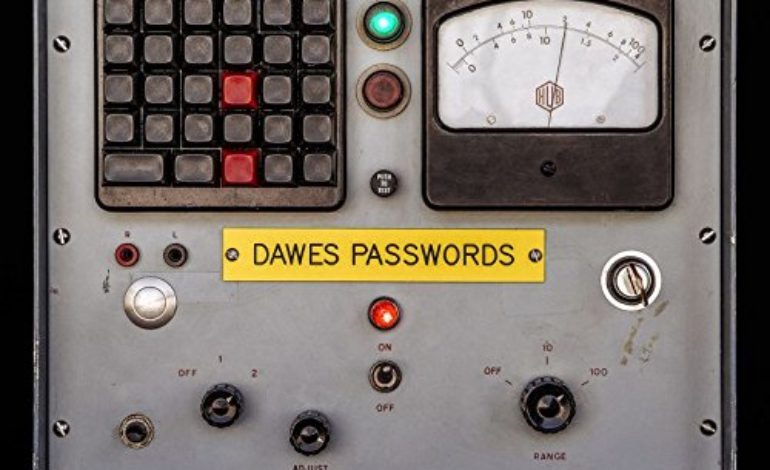

Making sense of an insensible world
Southern California rock stars Dawes have been going through something of a growing pain in recent years. The band spent the better half of the 2010s honing their Jackson Browne-meets-John Mellencamp, calm-yet-expansive sound. They embraced the synthwave fad going on in popular music circles and added more ’80s sounding elements to their penultimate studio release, 2016s We’re All Gonna Die, which threw their fanbase a curveball of a slightly different musical direction. While fans were split on the newly polarizing album, Dawes has continued to march on this new path with their sixth album, Passwords, released on June 22. Jonathan Wilson, who produced Dawes’ first two albums, returns to the producer’s chair for the new release.
Passwords keeps experimenting with various recording sounds and tricks while keeping the balladry spirit of older Dawes releases alive as well. The album sounds varied, with musical jumps like “Crack the Case” (a softer ballad based around guitar and piano melodies) into “Feed the Fire” (a jazz-rock disco beat that sounds like the product of a writing session from Daft Punk’s Random Access Memories and Steely Dan’s Gaucho.
“Living in the Future” opens the album with a rigid, Black Keys-esque guitar riff and a wave of a synthesizer washing over the chorus. The operatic chorus gives the track a metallic, dystopic future vibe. “Crack the Case” has a synth chord at its base, with piano and slide guitar embellishments at the core. It’s one of the slower songs on the album, with an underlying influence of singer-songwriter James McMurtry. Dawes frontman Taylor Goldsmith recently told Rolling Stone that the song was written in reference to the fallout from the 2016 Presidential election when it seemed like many U.S. citizens were at opposite ends of the political divide. This is most exemplified in the first chorus: “I wanna sit with my enemies/And say, ‘We should have done this sooner’/ While I look them in the face/ Maybe that would crack the case.”
When it comes to the lyrics, Dawes continues to show off their strength from previous albums. Dawes has always impressed with the wordplay in their music. Continuing in the spirit of the beautifully written title track from All Your Favorite Bands is the track “My Greatest Invention,” another slow number with a very simple drumbeat. The lyrics are some of the most soul-baring on the album, telling the story of preserving the memory of an ex-lover.
“Mistakes We Should Have Made” is a total mash-up of ’80s song-meets-heartland rock, featuring full acoustic guitar chords on top of reverberating drumhead hits and winding synth riffs. It sounds strange yet comforting, what one would get if you smashed a Tom Petty and the Heartbreakers song and a Duran Duran song together. This sounds like the perfect example of old Dawes and new Dawes coming together on Passwords.
The album finishes up with the ballads “Never Gonna Say Goodbye” and “Time Flies Either Way.” The latter song carries a heavy jazz influence and features very stripped down instrumentation with just piano, simple drum fills, saxophone, acoustic guitar and Goldsmith’s delicate voice waxing about the onward march of time in the reality of growing up, swaying in-and-out of relationships and making sense of the world.
For fans of We’re All Gonna Die, Passwords advances on this new artistic direction Dawes has grown into in the last few years. Older fans will still hear the core of the Dawes’ sound, although it has been embellished to include more reverberating drums and synthesizers. With ten songs that are ten different animals each in their own right, old and new fans should have no problem finding a new favorite track on this album.
